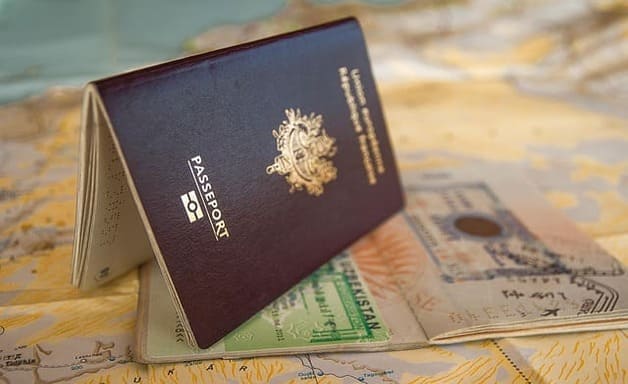
If you have a criminal record and you’re planning a trip to Aruba, it’s essential that you’re aware of the entry regulations that could affect you.
Here’s what travelers with a criminal history need to know about entry rules and how it affects the Aruba ED card process.
Does a Criminal Record Automatically Stop You from Entering Aruba?
Aruba is a separate country within the Kingdom of the Netherlands and controls its own immigration policies.
Unlike the Schengen Area, Aruba does not have a universal ban on travelers with criminal records. That means having a conviction on your record does not always mean you’ll be denied entry.
The key factor is how serious your offense was. For example:
- A DUI from 10 years ago likely will not be an issue
- A recent conviction for violent crime or drug trafficking may raise red flags
Immigration officers at Aruba’s border have the power to decide who gets in. Even if you’ve visited other countries recently without issue, that does not automatically guarantee entry to Aruba.
What Criminal Convictions Aruba Immigration Looks At
When you arrive in Aruba, immigration officers can assess your background if they have a reason to investigate. While there’s no automatic criminal record check for every traveler, certain information might be shared depending on your country of citizenship.
Here’s what they could consider:
- Type of crime: Non-violent offenses are usually overlooked. Crimes involving violence, drugs, or weapons may trigger concern.
- Severity: Felonies are taken more seriously than misdemeanors.
- Recency: Older convictions (especially if you have not reoffended) are less likely to cause problems.
- Flags in international systems: Aruba may receive alerts from Interpol or border-sharing systems if your name is listed.
- Entry bans elsewhere: If you’ve been deported or banned from another country, Aruba may question your eligibility.
In short, immigration can dig deeper if something prompts them to — like suspicious behavior, incomplete documents, or a tip-off from international authorities.
Visiting Aruba With Minor Offenses
Travelers with minor infractions are rarely stopped at the border.
Common examples:
- Shoplifting or petty theft over 5 years ago
- Disorderly conduct or public intoxication charges that are closed
- Driving-related offenses (like speeding or DUIs) with no ongoing legal issues
If this sounds like your situation, you're unlikely to have issues entering Aruba.
When applying for the ED Card, there’s no field that asks about criminal records, and Aruba does not run background checks as part of the ED Card approval. Most travelers in this category are cleared automatically once they fill out the form.
Entering Aruba With Serious Convictions
Criminal records that involve more serious offenses may result in a border denial, even if you hold a valid passport and a completed ED Card.
Examples of serious offenses:
- Drug trafficking
- Assault or battery
- Sexual offenses
- Weapons possession
- Fraud or financial crimes
- Gang-related or organized crime activity
If your conviction falls into any of these categories, Aruba immigration may see you as a public safety risk. This does not mean you’ll automatically be rejected, but the chance of being stopped at the border is higher.
Even if you successfully get your ED Card, border agents may still ask questions or request more documentation upon arrival.
Does the Aruba ED Card Ask About Criminal Records?
No, it does not. The Aruba ED card (Embarkation/Disembarkation card) is an online form all visitors must fill out before traveling to Aruba.
The ED card is used to speed up arrival procedures and manage public health declarations — not to run background checks.
The form includes:
- Full name and passport information
- Flight and accommodation details
- Contact details in Aruba
- Basic health screening questions (for COVID-19 or other conditions)
- Travel insurance confirmation (recommended)
Nowhere on the ED Card application are you asked about criminal convictions, past legal trouble, or refusals of entry elsewhere. This means:
- You can apply for the ED Card even if you have a record
- You’re unlikely to be flagged during this process
But remember: the ED Card does not equal entry approval. Final entry decisions are made at the border.
Can You Be Denied Entry into Aruba Even With an ED Card?
The Aruba ED Card is a mandatory travel form, but it does not act like a visa or guarantee entry.
Even with a completed ED Card and a valid passport, Aruba immigration officers can deny entry if they have concerns about your criminal history.
Here are some situations where this might happen:
- You have open arrest warrants
- You appear on an international watch list
- You’re suspected of being a flight risk or overstaying
- You have a history of violent or drug-related offenses
In some cases, travelers are questioned briefly and then allowed in. In other cases, they may be refused entry and sent back on the next available flight.
What Should You Do If You Have a Criminal Record?
Here are some practical steps to take:
- Check with an Aruban consulate or the Kingdom of the Netherlands embassy in your country. They can advise on whether your record might pose a problem.
- Carry supporting documents if needed — such as proof that your conviction is spent, or letters confirming your rehabilitation.
- Avoid last-minute travel. If you’re unsure whether you can enter Aruba, do not risk buying non-refundable tickets without checking first.
- Apply for the ED Card anyway — it’s required for all travelers and does not ask about criminal history.
If your case is complex or you’ve had problems entering other countries recently, it may be wise to speak with an immigration lawyer before traveling.


